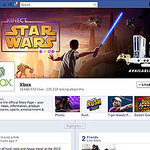A lot of discussion is happening at the moment about the defining of Web 3.0. What is Web 3.0? In short, it is a defining phase of the evolution of the web. This question can be answered more thoroughly by looking at Web 2.0, a phase of the web that is happening at the moment.
Web 2.0 is all about social media, sharing data, and ranking/rating relevant data. For example, Twitter and Facebook are popular social media groups that allow us to keep in touch with current friends and find friends with similar interests, based on any groups that a user is a member of. Amazon.com allows users to rate information, such as reviews and books; groups of 'similar' products tailored to the user, based on their ratings/purchases and the ratings/purchases of other users, are displayed. In short, Web 2.0 defined the evolution of the web as a tool to share data and content with others by using social media and getting users to rate and rank data on interest or usefulness.
In Web 3.0, the evolution of the web will continue utilising social media and searches, but it will be more focused on tailoring data specifically to users. Search engines may remember user preferences as a basis for future recommendations, such as locating events and places (shops, restaurants) that a user may like based on the data gathered in Web 2.0. Unlike Web 2.0, Web 3.0 will be focusing on the user and tailoring data.
According to Strickland(1), experts believe that Web 3.0 will be "like having a personal assistant who knows everything about you", and users will not need to spend so much time trying to find the best bargains or options. A question could be entered in a search engine, and instead of spending a few minutes hunting around for it, the results could be displayed more meaningful to the user.
Web 3.0 would probably work based on recording each user's search preferences and tailoring them so that no two searches would be the same for every user.
More information about the different different phases of the web and presentations can be read and watched here: http://www.labnol.org/internet/web-3-concepts-explained/8908/
(1) Strickland, Jonathan. How Web 3.0 Will Work. http://computer.howstuffworks.com/web-302.htm [16 May, 2011].
Web 2.0 is all about social media, sharing data, and ranking/rating relevant data. For example, Twitter and Facebook are popular social media groups that allow us to keep in touch with current friends and find friends with similar interests, based on any groups that a user is a member of. Amazon.com allows users to rate information, such as reviews and books; groups of 'similar' products tailored to the user, based on their ratings/purchases and the ratings/purchases of other users, are displayed. In short, Web 2.0 defined the evolution of the web as a tool to share data and content with others by using social media and getting users to rate and rank data on interest or usefulness.
In Web 3.0, the evolution of the web will continue utilising social media and searches, but it will be more focused on tailoring data specifically to users. Search engines may remember user preferences as a basis for future recommendations, such as locating events and places (shops, restaurants) that a user may like based on the data gathered in Web 2.0. Unlike Web 2.0, Web 3.0 will be focusing on the user and tailoring data.
According to Strickland(1), experts believe that Web 3.0 will be "like having a personal assistant who knows everything about you", and users will not need to spend so much time trying to find the best bargains or options. A question could be entered in a search engine, and instead of spending a few minutes hunting around for it, the results could be displayed more meaningful to the user.
Web 3.0 would probably work based on recording each user's search preferences and tailoring them so that no two searches would be the same for every user.
More information about the different different phases of the web and presentations can be read and watched here: http://www.labnol.org/internet/web-3-concepts-explained/8908/
(1) Strickland, Jonathan. How Web 3.0 Will Work. http://computer.howstuffworks.com/web-302.htm [16 May, 2011].



Leave a comment